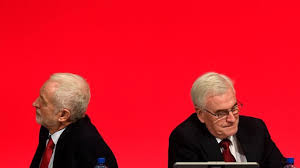The hard left, including the group that currently controls the British Labour Party, is the ideological wing of the left. So where others are more pragmatic and look to evidence to guide their thought, the hard left is driven principally by its beliefs. It has faith in the leader, for instance, or faith in its purity of principle.
The trouble with faith is that it depends on nothing but one’s own thinking. Change your mind, which is pretty easy, and your political stance changes with it. This can lead to some serious dysfunctions.
The most painful currently is the British hard left’s stance on Brexit. This is apparently ambivalent. The reality, which the leadership will not admit, is that they back Brexit. Recently, interviewed by Robert Peston of the ITV channel, Chuka Umunna from the right of the Labour Party referred to ‘whether Brexit actually happens.’ John McDonnell, Shadow Chancellor of the Exchequer and a leading figure of the hard left, replied ‘It will’.
 |
| John McDonnell (right) with his pal and ally Jeremy Corbyn |
At another level, though, it puts these people in strange company. Brexit is chiefly backed by the hard right, specifically by a xenophobic and anti-immigrant right. These are the tendencies that Labour is expected to oppose with all its strength.
Some attempt to justify this position by arguing that many Labour MPs represent constituencies which voted for Brexit. Again, this is a curious position to take by people who claim to stand for strict principle. Electoral calculation when it involves compromising a fundamental tenet of the left? Not what one would expect from self-proclaimed socialists.
That the hard left finds itself in bed with those who oppose everything it ostensibly stands for should, one might imagine, cause it to question itself. But it doesn’t. Because it is unanchored, it can drift anywhere, even into the arms of the xenophobes and nationalists.
Still, Brexit’s just one question. It could be a one-off.
That’s why the latest development by the same John McDonnell is so interesting.
The Conservatives, currently in government, generally try to lighten the burden of taxation on the richest and shift it to the people least able to bear it. That has been a main thrust of the latest budget proposed by the British Chancellor Philip Hammond. He has proposed income tax changes that will greatly benefit the wealthiest while delivering far less to the poorest, who desperately need it.
In other words, it’s a deeply regressive approach to taxation, making the poor pay more while the rich pay less. The Labour Party is normally committed to the opposite, a progressive policy that makes the rich pay higher taxes while lightening the load on the poor.
So it’s curious to find McDonnell declaring that Labour would not be opposing the Hammond measures.
One of the principal roles of an Opposition is to oppose. I suppose the clue is in the name. An Opposition should never back a government unless it absolutely has to, perhaps because it would endanger national security if it did not.
Certainly, the reason I’ve been given for not opposing the budget tax cuts is indefensible: the suggestion is that they provide some benefit to the poor, even though far less than to the rich, and therefore opposing them would be presented as ‘robbing me of my tax break’. This comes down to setting party policy by what the hostile press would say about it.
In other words, it’s handing control over Labour policy not to the members, not even to MPs, but to Labour’s opponents.
There’s another irony here. It is the hard left that never stops denouncing the media – the ‘mainstream media’ or ‘MSM’ – for its perverse behaviour towards Labour. So allowing what it might or might not say about a policy to determine the behaviour of its leaders in parliament defies belief. What’s more, the result is the same as over Brexit: it puts Labour in the same bed as the right.
Their intentions may be good. But we know which road is paved with good intentions. And what matters is less the road than the destination.
That’s the trouble with having no anchor in reality. That’s the hard left’s problem. But sadly, because it controls the leadership, it’s a problem for the whole of Labour.
Well. It controls the leadership for now.
No comments:
Post a Comment